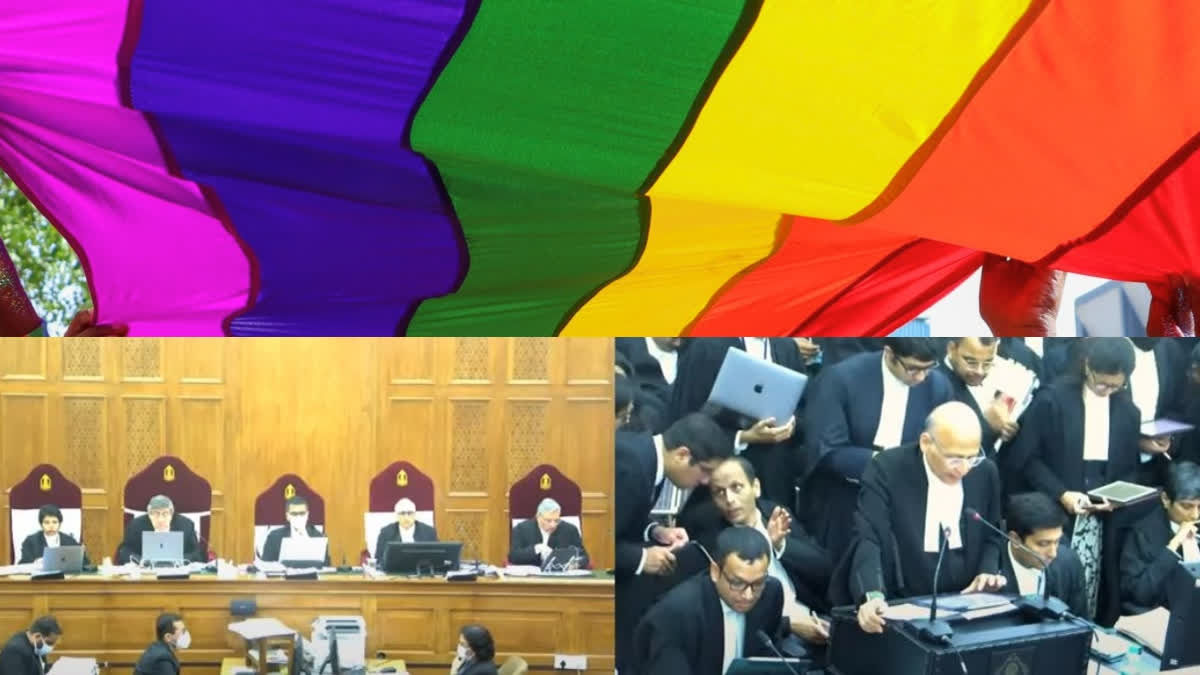New Delhi: In the ongoing hearing of petitions in the Supreme Court seeking legalisation of same-sex marriage in India, the Chief Justice of India, DY Chandrachud, on Wednesday opposed the central government's stand wherein it has stated through an affidavit that granting recognition to same-sex marriage is an "urban elitist view". The CJI said that something that is innate cannot be urban elitist.
He said that it may be more urban in its manifestations because more people in the urban areas are coming out of the closet but the government has not backed its stand through any data that would indicate that this is urban elitist. "It may be more urban in its manifestations because more people in urban areas are coming out of the closet," the CJI remarked. "There is no data coming out of the government that this is urban or something," he added.
A constitution bench comprising the CJI, Justice Sanjay Kishan Kaul, Justice Ravindra Bhat, Justice Hima Kohli, and Justice PS Narasimha is hearing a batch of petitions. Wednesday was the second day of the hearing in the Supreme Court. The Central government on Wednesday filed a fresh affidavit in the apex court, urging to make all the state governments and Union Territories party to the petitions seeking recognition of same-sex marriage.
The affidavit, filed by Joint Secretary and Legislative Counsel KR Saji Kumar, states that the present case involves the legislative rights of the states under the Seventh Schedule of the Constitution, as well as the rights of the residents of the states. The government contends that consultation with all the states is necessary for the adjudication of the petitions.
After the CJI made the statements, many advocates gave the example of their clients who they said were part of the LGBTQ community and belonged to humble backgrounds. Senior Advocate KV Vishwanathan said that his client is a transgender who was disowned by the family, begged on the streets, and is the director of KPMG today.
He said that branding her an urban elitist shows an absolute lack of grace. Another example cited by an advocate said that the client who is now a trans-activist was thrown out of her house at 15. She had to drop out of school, was on the streets, and struggled to come back to the mainstream.
Senior Advocate AM Singhvi started his submissions on Wednesday arguing that statute and intent can never be the limitation in granting the community people rights and it has to be evolving. He argued that the Special Marriage Act was intended for agnostic so by reading it as agnostic to sexual orientation, you are not making a leap of faith.
Singhvi argued that societal values can not trump equal treatment. "If I am here based on exclusion, it can not trump non-discriminatory principles. Homosexual marriages may not be typical to traditional marriages but are as real as traditional ones," he said.
Earlier in the day, the affidavit filed by the centre cited entry 5 of the Concurrent List, which includes marriage and divorce, infants and minors, adoption, wills, intestacy and succession, joint family and partition, and all matters in respect of which parties in judicial proceedings were immediately before the commencement of this Constitution subject to their personal law.
"It is clear that the rights of the States, especially the right to legislate on the subject, will be affected by any decision on the subject. It is submitted that further, various States have already legislated on the subject through delegated legislations, therefore making them a necessary and proper party to be heard in the present case," the affidavit said. Naturally taking a decision without consulting the states on the present issue would render the present adversarial exercise incomplete and truncated, the government said.
"The framers of the Constitution have specifically provided for a separate entry (entry 5) in the concurrent list which is a part of the seventh schedule of the Constitution of India conferring a constitutional function of legislating with respect to this institution of “marriage”, the requisite conditions for a valid marriage, regulations of such institutions like making provisions for divorce, alimony etc," the affidavit pointed out.
"It is submitted that the said issue goes to the root of the present matter and has far reaching implications. It is therefore humbly requested that all States and Union Territories be made a party to the present proceedings and their respective stance be taken on record and in the alternative, allow the Union of India, to finish the consultative process with the States, obtains their views/apprehensions, compile the same and place it on record before this Hon’ble Court, and only thereafter adjudicate on the present issue," the affidavit said. The hearing in the matter will continue on Thursday.
Also read: Concept of man and woman not absolute: Supreme Court on same-sex marriage



